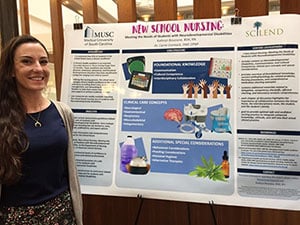SC LEND Trainees Attend the Nurturing Developing Minds Conference
April 22, 2019

|
| An SC LEND trainee and practicing nurse presented on information related to providing specialized training for school nurses working with students with disabilities. |
The members of the South Carolina LEND program recently attended a state conference in March 2019 focusing on research and initiatives that are driven to create supportive environments to help children and their families flourish. The Nurturing Developing Minds conference provided several opportunities to the LEND trainees, including attending reviews of recent research and policies on developmental surveillance and screening (with a particular emphasis on the Help Me Grow nationwide initiative) and on the long-term risks of spanking and promising interventions (i.e., the No Hit Zone). One of the speakers, Dr. Christina Bethell, discussed an ongoing project to enhance family and healthcare provider engagement during medical visits (i.e., the Well-Visit Planner). Brianna Eberl, a first year occupational therapy student and SC LEND trainee stated, "I loved the opportunity to hear from such a wide array of experienced professionals on so many relevant topics pertaining to pediatric practice. I especially enjoyed learning from the keynote speaker and poster presentations about the innovative research and advocacy efforts that are being done across our state and nation to promote wellbeing of children." One key experience that SC LEND trainees also had was the family panel, which is a panel made up of self-advocates, parents, and siblings of individuals with disabilities. The panel answered prepared questions based on their individual experiences and provided valuable insight in regards to living with a disability in schools, medical facilities, and at home.
The attendees took advantage of the several opportunities to network with professionals and students from neighboring states during poster presentations. SC LEND members also presented their own research they completed over the course of their training related to disability services. Poster presentations captured a wide audience and range of topics, including identifying children with congenital heart defects who are at-risk for further developmental delays to developing a family-friendly handout to include local resources for children with neurodevelopmental disabilities. One presenter, who identified as having autism, researched and discussed representation of neurodiverse populations in young adult fiction. This individual connected their personal experiences with their research, maximizing the impact their presentation had on attendees. Some of the key findings found that neurodiverse populations were predominantly represented as having negative school experiences and suicidal tendencies, which the presenter emphasized was a negative portrayal of individuals with disabilities.
Overall, the speakers emphasized the need for healthcare providers to establish relationships with their patients and to maximize their supports and connect them to available resources. It was a call to action reminding providers to shift from medical health models and pathology to focus on wellbeing and positive events for children to maximize success and flourishing. This conference also helped expose the trainees to a wide network of state services, emphasizing the importance of attending state conferences to understand the local need and resources. Eberl agreed, "The conference was a great learning and networking experience, and everything was very well executed!"

Two of the SC LEND Trainees, an occupational therapy student
and a practicing BCBA, presented their family-centered
guide to local autism-related services.







